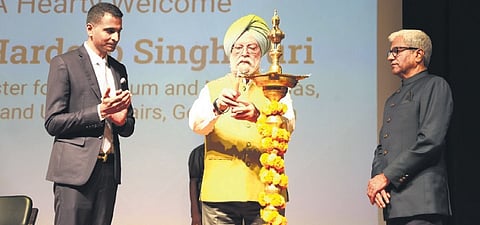

BENGALURU: A strong India-Russia relationship is good for global stability in the world order, which is shifting rapidly from bipolar to multilateral and polycentric, said Dr Feodor Voitolovsky, director, Primakov Institute of World Economy and International Relations (IMEMO), Russia. He was speaking on ‘Russia and India in the Changing World Order - Track II Dialogue’ during the inauguration of REVA Centre of Excellence for Geopolitics & International Studies, REVA University.
Voitolovsky said the two countries have “strong interests in a very balanced polycentric, multilateral system in which they can play a significant role. Our countries do not have any contradictory visions of international systems and do not have contradictory interests. This is the best driver for our efforts to build a polycentric world order. There will never again be a bipolar world order, whether it is China or the United States”, when asked by TNIE regarding the transition in geopolitics and the world order.
Asked about the time line of the ongoing Russia-Ukraine war, its impact on the world economy and sanctions on Russia, Voitolovsky said the impact of sanctions is having more “psychological effect than economic” and gave the example of soaring Russian trade with India. “In 2023, India-Russia trade had mounted to $65 billion. It’s a fantastic figure considering that earlier, it was around $8 billion.
The decision of Prime Minister Modi to continue and develop trade relations with Russia was rational and in India’s interest. The sanctions have a positive effect on Russia. The limitation on trade with the European Union has driven Russia actively to work with the Asian market and India, which is a permanently growing market. I see a growing demand for Indian goods and services in Russian markets in the last two years. The next step is investment cooperation,” he added.
Regarding the future of Russia-Ukraine war, Dr Alexey Kupriyanov, head of Centre of the Indo-Pacific Region, IMEMO, said there is no clarity on when the Russia-Ukraine conflict will end and that sanctions will be much longer than the conflict. “It’s easier to put sanctions but much harder to end them. Our interest in Eastern markets will continue even after sanctions are lifted,” said Kupriyanov.
Speaking about the India-Russia relationship, Prof Madhav Das Nalapat, REVA University Advisory Board member, said, “India has maintained a close and warm relationship with Russia despite so many geopolitical challenges and a lot of advice to the contrary from individuals who are important policy makers in countries exceptionally close to us, for example the US.” He added that India and the United States are the two closest countries because of huge people to people connect. He underscored the need for a bigger people to people (PtoP) connect with Russia.
The Centre for International Studies and Geo Politics was inaugurated by Union Minister for Petroleum and Natural Gas, Housing and Urban Affairs, Hardeep Singh Puri. He congratulated Chancellor, REVA University, Dr P Shyama Raju and Pro Chancellor Umesh S Raju on their expansive academic endeavour and opening of the Centre. He highlighted Prime Minister Modi’s role in steering the country forward, bringing India to the “centre of geopolitics”.
Puri added that “we are in a phase of transition towards greater good. India’s imminent rise as the world’s third-largest economy in the next five years is a given”. The two-day event was part of REVA University’s ‘Vishwa Samvad 2024’.